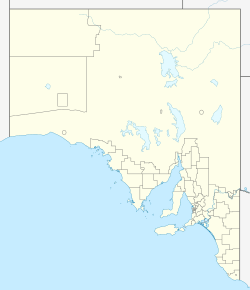Rabbit Island (South Australia) facts for kids
| Geography | |
|---|---|
| Location | Spencer Gulf |
| Coordinates | 34°36′31″S 135°58′57″E / 34.608483°S 135.982584°E |
| Highest elevation | 10 m (30 ft) |
| Administration | |
|
Australia
|
|
Rabbit Island is a small, special island located in Louth Bay, which is part of Spencer Gulf in South Australia. It's about 32 hectares in size. To help you imagine, that's like 32 football fields! This island also has an old French name, Ile Raynal.
Rabbit Island is different from the larger Louth Island nearby. Louth Island is privately owned, but Rabbit Island is public land. This means it belongs to everyone and is part of the Lincoln National Park. Being part of a national park helps protect the island's natural beauty and the amazing plants and animals that live there.
Contents
Island Wildlife and Plants
Rabbit Island is home to many different kinds of native plants and animals. Some of these species are very important and need our protection.
Birds of Rabbit Island
Many interesting birds have been seen on Rabbit Island. Some are quite rare!
Little Penguins
Little penguins, which are the smallest penguins in the world, have been seen nesting on Rabbit Island. This means they build their homes and lay their eggs there. We don't know exactly how many penguins live on the island, but it's exciting to know they are there!
Rare and Endangered Birds
Several bird species on Rabbit Island are listed as being of "conservation concern." This means their populations are shrinking, and they need special help to survive. These birds are protected under a law called the National Parks and Wildlife Act 1972.
- The fairy tern is an endangered bird. This means there are very few of them left in the wild, and they are at high risk of disappearing forever.
- Other birds listed as rare on the island include the bush stone-curlew, the Cape Barren goose, the sooty oystercatcher, and the rock parrot. Being rare means there are not many of these birds, but they are not yet in as much danger as endangered species.
Protecting these birds and their homes on Rabbit Island helps make sure they can continue to live and thrive for many years to come.


